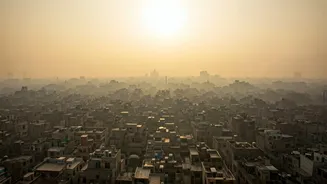Severe Air Quality
On October 19, 2025, Delhi's air quality slipped into the 'severe' category, a stark reminder of the challenges the city faces annually. The data showed
that pollution levels were increasing, posing a significant threat to residents' health. Hotspots within the city were experiencing alarming AQI levels, with Colaba topping the charts at an AQI of 209. The worsening air quality has raised concerns among health officials and environmental experts, who are worried about the potential health implications of exposure to such high levels of pollution.
NCR Pollution Levels
The air quality crisis isn't limited to Delhi alone; the National Capital Region (NCR) is also bearing the brunt of the pollution surge. As reported, pollution levels in the NCR were rising, exacerbating the overall environmental situation. This widespread pollution underscores the need for regional cooperation and coordinated strategies to combat the issue effectively. The rise in pollution across NCR intensifies the urgency of implementing comprehensive measures to improve air quality and protect the health of millions residing in the region, particularly as Diwali celebrations draw near.
Delhi Choking Before Diwali
The question of whether Delhi is 'choking' before Diwali is not a rhetorical one, as the data unequivocally suggests a severe deterioration in air quality. The city is experiencing extremely high levels of pollutants, making the air unsafe for breathing. This situation is particularly concerning due to its proximity to Diwali, a festival known for firecrackers and other celebratory activities that could worsen air pollution. The combination of existing pollution levels and the anticipated spike during Diwali could pose serious health risks, particularly for vulnerable populations such as children, the elderly, and individuals with respiratory ailments.
Understanding the Data
The data from October 19, 2025, provides a snapshot of the worsening air quality situation. The AQI readings serve as a crucial indicator of the pollution levels, highlighting the degree of the air quality deterioration. Specific data points, like Colaba's peak AQI of 209, provide a clear understanding of the severity in different areas of the city. Analyzing these numbers is crucial to grasp the gravity of the situation and the immediate need for action. Understanding these data is critical for residents and authorities to be aware of the danger and make informed decisions to safeguard their health.
Looking Ahead
As Diwali nears, the focus shifts to what can be expected regarding air quality. Experts are predicting a further surge in pollution levels if proactive measures aren't put in place. This includes strategies like the strict implementation of pollution control guidelines, enhancing public awareness campaigns, and promoting cleaner modes of transportation. The effective execution of these measures is essential to mitigate the adverse effects of air pollution and guarantee a healthier environment. There is a need for proactive measures to be taken to protect the public during the Diwali celebrations, and to prevent the pollution levels from spiraling out of control.












